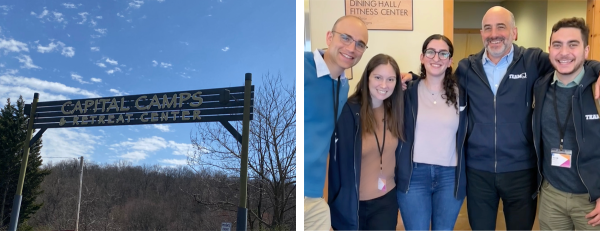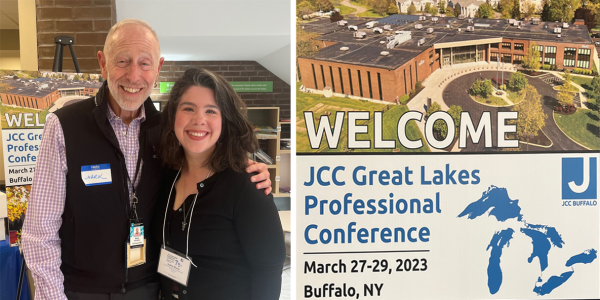By Doron Krakow
Strength in Adversity
Over the past few days, a series of remarkable gatherings took place across the continent—gatherings of hundreds of Jewish Community Center professionals from dozens of JCCs, centers, and camps representing different regions of our movement. Programs and settings varied, but each one focused on skill-building while addressing emerging challenges around programs, operations, and community dynamics. At their core was a shared commitment to teamwork, to creating relationships across geographies, to the interplay between veterans and newcomers—and between communities, both large and small. They were about strengthening the ties that bind colleagues and partners, with a shared commitment to something greater, a reminder that none of us is on our own as we confront the possibilities before us.

I was struck by their diversity. There were so many newer members of our professional family—the dynamics that have impacted both the workplace and the labor market in recent years having contributed to notably higher staff turnover. Wizened veterans and wide-eyed newcomers mixed and mingled easily—the former projecting pride in the impact they’ve achieved over the course of unfolding careers, with so many of the latter drawn to our field and the opportunity to be part of building community at a time of increasing division. They were Jews and non-Jews of varied races and descriptions, religious and not-so-religious, and reflective of the breadth of personal identities found in all communities.

Conversations and discussions varied, but in both large, formal settings and smaller, informal ones, we talked about mission, our fundamental purpose—to be the engine for greater Jewish community and more vibrant Jewish life in neighborhoods, towns, and cities from coast to coast.

These remarkable professionals are representative of the make-up of JCC staffs throughout Canada and the United States—more than 35,000 of them working full or part-time throughout the year—making JCCs far and away the largest employer in the organized Jewish community. They are bolstered by another 20,000 seasonal staff who work in our day and overnight camps, and on our Israel summer programs each year. Altogether, they form the Jewish community’s professional backbone—and their determination to pursue and embrace opportunities to deepen their own Jewish education fires our imaginations about how much more we, as a movement, will yet become.

Beyond the workshops, outside experts, team-building, shared meals, and new connections, these gatherings—taking place as they did amidst remarkable developments in Israel and in the wider Jewish world—also devoted time to considering the ever-changing context of our work.
I arrived in Tucson for the Western Regional JCCs Professional Conference having returned the preceding day from Israel where, in response to a public outcry over unfolding actions of a still new coalition government, Prime Minister Netanyahu had announced a suspension of the legislative process around judicial reform to allow for negotiations with opposition parties. He expressed his intention to achieve a compromise that would serve the country’s interests and reassure a restive populace. While acknowledging that a great deal of uncertainty remains as to the outcome of this process, we have reason to feel reassured about the strength and vibrancy of Israeli democracy on the cusp of its 75th birthday.
Participants talked about the Foundation to Combat Antisemitism’s newly launched blue-box campaign, the latest high-profile effort to emerge in recent years in response to a disturbing rise in antisemitism. JCC professionals are acutely aware of the rising concern and the need to be attentive and vigilant with regard to local dynamics. There was discussion about the role JCCs can and should play in partnership with organizations like ADL, AJC, and local JCRCs, as well as JCCs’ unique position as community builders in bolstering a sense of unity and fortitude among Jews, which is perhaps the most important factor in enabling a community under duress to contend with the haters and those who enable them.
We talked about divisions that seem to increasingly define our society and the extent to which community building—across backgrounds, politics, religious affiliation, and identity—has become almost counter-cultural at a time of growing polarization, or perhaps more accurately, atomization around us. We underscored the even greater importance of such efforts in times like these. What an enormous point of pride it is for all who take part in the JCC Movement that once someone passes through a JCC’s doors—anywhere in North America—the things that bind us together are far more important than those that set us apart.
Perhaps most striking for me was that none of these conferences were even on the calendar when we last celebrated Rosh Hashanah. Typically, JCC Association convenes a continental gathering of this kind in every odd calendar year, but the great resignation’s impact on our workforce during the middle months of 2022 left us unable to proceed as planned. Though as we experienced throughout the pandemic, when one part of our movement family is down, another steps in to lend a hand. Leaders across the field, recognizing the importance of bringing our people together, quickly formulated a new plan and these regional conferences were the result. This week’s gatherings—in Tampa and Tucson, Buffalo and at Capital Camps—followed on the heels of a similar gathering in Austin in February and preceded another in Nashville after Pesach. In all, perhaps twice as many JCC professionals will have taken part in such conferences this year than would have attended the continental event originally envisioned—and we are the better for it. And back at full strength, JCC Association was and will be able to be a presence at each of them.
What a remarkable demonstration of the power of community, and it comes at a particularly meaningful time. Next week we’ll gather with family and friends at the Passover Seder to recount, once more, the story of our people’s exodus from slavery in Egypt, to freedom and independence in the Promised Land. Along the way, we were transformed from a bedraggled collection of former slaves, into a nation—a nation at the start of a 4,000-year chain of Jewish history in which each generation has forged a single link; a responsibility—which is passed to the generation that follows. This week, once more, our link grew notably stronger.
Wishing you and yours a Chag Kasher v’Sameach | חַג כָּשֵׁר וְשָׂמֵח—a very happy Passover.
שַׁבָּת שָׁלוֹם | Shabbat shalom.

Doron Krakow
President and CEO
JCC Association of North America

 With Jerusalem under siege, the Haganah launched Operation Nahshon on April 3, 1948 to clear a corridor from the coastal plain to create a lifeline for the desperate Jewish residents. It is the first time the Haganah operated on a brigade level and attacked for the purpose of taking territory. The breakthrough came 12 days later, on April 15, and the supplies delivered enabled the city’s beleaguered Jews to hold out for another two months. And that’s the way it was…
With Jerusalem under siege, the Haganah launched Operation Nahshon on April 3, 1948 to clear a corridor from the coastal plain to create a lifeline for the desperate Jewish residents. It is the first time the Haganah operated on a brigade level and attacked for the purpose of taking territory. The breakthrough came 12 days later, on April 15, and the supplies delivered enabled the city’s beleaguered Jews to hold out for another two months. And that’s the way it was…
Reader Interactions